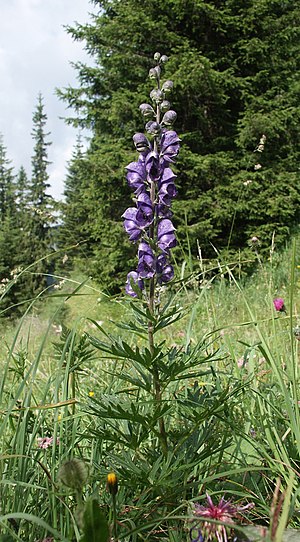Aconitum napellus
Μέμνησο νέος ὤν, ὡς γέρων ἔσῃ ποτέ → Iuvenis memento te fore aliquando senem → Bedenke jung schon, dass dereinst ein Greis du bist
Latin > Greek
ἀκόνιτον, ἀκόνιτος, σκορπίος, θηλυφόνον
Wikipedia EN
Aconitum napellus, monkshood, aconite, Venus' chariot or wolfsbane, is a species of highly toxic flowering plants in the genus Aconitum of the family Ranunculaceae, native and endemic to western and central Europe. It is an herbaceous perennial plant growing to 1 m (3 ft 3 in) tall, with hairless stems and leaves. The leaves are rounded, 5–10 cm (2.0–3.9 in) diameter, palmately divided into five to seven deeply lobed segments. The flowers are dark purple to bluish-purple, narrow oblong helmet-shaped, 1–2 cm (0.39–0.79 in) tall. Plants native to Asia and North America formerly listed as A. napellus are now regarded as separate species. The plant is extremely poisonous in both ingestion and body contact.

